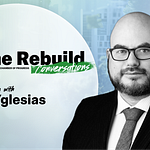In this episode of The Rebuild, Tahra Hoops and Gary Winslett sit down with Congressman Ritchie Torres to unpack what “abundance politics” really means in practice. From dismantling self-inflicted scarcities in housing, energy, and infrastructure to rethinking outdated policies like the Jones Act, Torres argues for a progressivism that actually delivers progress. The conversation spans the importance of place-based policy, the pitfalls of bureaucratic red tape, and the need for regional planning that meets communities where they are; whether in the South Bronx or rural America. Along the way, they dive into the promise and hype of AI, the transformative potential of biotech and GLP-1 drugs like Ozempic, and more. It’s a candid, idea-rich discussion about how to make growth, equity, and tangible improvements a reality for all.
Tahra Hoops: Congressman Ritchie Torres, thank you so much for being here on the rebuild. We are super excited to have you. we can go ahead and get things started. I do have a question to start off with. I want to start off with the idea of abundance politics. You have been a city council member in the Bronx and now you're in Congress, so you've seen both how city and federal governance can either build things or bog them down. So what does an abundance agenda mean to you in practice? How can we take the technocratic conversations outside of those private conference rooms and have Washington help cities like New York actually build more, whether it's housing or infrastructure?
Ritchie Torres: At core of the abundance movement is a recognition that many of the scarcities in our society. The shortage of housing, the shortage of energy, the shortage of infrastructure, the shortage of essential public goods on which all of us depend. Those scarcities tend to be self-inflicted. It tends to be the product of public policy. So when it comes to an area like housing, have zoning and land use policies that artificially restrict the supply of housing in cities like New York and DC. We have lending restrictions that artificially restrict the supply of credit available for the financing of housing, including first term home ownership. You see it with energy. Why is it that Texas is building more clean energy than New York? It's not because Texas is more ideologically committed to the clean energy transition. It's not because Texas has solved the problem of white supremacy. It's because Texas has less bureaucracy, less bureaucratic red tape. One of the cruel ironies of our society is that it is easier to build clean energy infrastructure in the states that deny climate change than it is in the states that consider it an emergency. And so I think the abundance agenda is an attempt to confront the cognitive dissonance at the core of modern progressivism, which is quite different from the progressivism of FDR, which was a progressivism that could build and build big and build boldly.
And, that's the spirit, that's the tradition of progressivism that the abundance movement seeks to restore.
Gary Winslett: It's really interesting you bring up FDR there because in many ways, the new deal is about taking the politics of New York as it existed at the time and expanding it out and being like, okay, what lessons can we learn from New York's politics and apply it during the Great Depression?
I just think it's really interesting that you bring up FDR because sometimes abundance critics from the left like to take the mantle of FDR and, to me, this whole abundance agenda is about doing that creation of more that he was all about.
Ritchie Torres: And look, conservatives historically advocate for the deregulation of the market. And I'm the kind of Democrat who supports deregulation under the right conditions— but abundance is about the deregulation of government. It's about enabling the government to govern, to build energy, food and healthcare and housing and, that just strikes me as common sense. I find it confounding that abundance is controversial. We should all want abundant, affordable public goods.
Gary Winslett: Absolutely.
Tahra Hoops: We completely agree with you there. That is a lot of the work that we're doing at The Rebuild because to us, this is how you achieve the progressive goals that we can all agree on. So it always confuses us when people who should be allies are the ones who actually step in the way or creating the obstacles and it's like, no, we're on your side. We all want affordable housing. We've all seen how the housing crisis gets around.
Ritchie Torres: If you're anti-government then I could understand why you cripple the ability of the government to govern. But if you claim to be progressive, then how could you possibly oppose the abundance movement, like what good is a progressivism that does not result in actual progress? The central value of progressivism should be progress, which is measurable in the real world.
Gary Winslett: A hundred percent. If you want more good things for everyone, you have to start with the more good things. And that's how you get there.
One of the things I wanted to ask you about is the Jones Act. Because it's one of these really extreme examples of a policy that economists will tell you is terrible. But it has these really concentrated special interests behind it, and they drive up costs for everybody else, but that everybody else is really diffuse. And so this is why a lot of policymakers who know better know it's bad, won't touch it, but then you have this bill to amend the Jones Act to reduce energy cost in Alaska and HawaiI and Puerto Rico. And so I'm just curious, like what made you lean into this fight?
Ritchie Torres: It strikes close to home because I'm Puerto Rican, and Puerto Rico has the single worst electric grid in the country, and the Jones Act is a hidden tax on the energy needs of an energy poor island, an island that's struggling to survive. The tragic story of Puerto Rico is one in which the lowest income rate payers are paying among the highest electricity bills for a failing grid. I think rate payers in Puerto Rico pay about 26 cents per kilowatt hour, which is 53% higher than the national average of 17 cents. So think about that for a moment.
The people of Puerto Rico who are among the lowest income in the United States are paying 53% more than the rest of the country for a grid that is failing them catastrophically. And one of the causes of energy poverty in Puerto Rico is the Jones Act. It is objectively the case that the Jones Act raises the cost of energy and artificially restricts the supply of energy in the most energy poor island in the United States. And that to me is wrong. That to me is not progressivism. It's a perversion of progressivism, and it's a classic case study in concentrated benefits and dispersed costs. There's a powerful lobby for concentrated benefits. But the lobby against dispersed costs is not so powerful.
Gary Winslett: No, it's just the people.
Ritchie Torres: Yeah, it's the people.
I'm a college dropout, so I'm not an intellectual. I do not pretend to be the brightest bulb in the chandelier, but if a policy is producing an absurd result, we should rethink the policy. If there's a policy that makes it more expensive for Puerto Rico to get energy from within the mainland United States than to get it from Qatar… maybe we should rethink that policy. If it is cheaper for the United States to send energy to a foreign country like the Dominican Republic than it is to a territory, a US territory like Puerto Rico… that is an absurd result, a perverse result that should have us rethinking the underlying policy.
Tahra Hoops: I completely agree with that frame of thinking and I apply that to policy in general. It's part of the policy feedback process. No matter how well intentioned your goal might be, no matter how progressive you think this is going to help us… if it's not working... on the real ground... if the reality is that people are actually getting a massive disadvantage as we were seeing in Puerto Rico, in the case of the Jones Act, it is okay to understand and admit like "hey, we messed up here. How can we go back and not just put like a bandaid over a dam over here, but actually overhaul and create a system where everyone is on the same level.”
Ritchie Torres: And also it fails to live up to its purported national security rationale, right? Like the argument for the Jones Act is that it will maintain a ship industry here in the United States. Ship building in the United States has all but collapsed. It's a shell of its former self. The difference between the United States and China is orders of magnitude and the irony is that the Jones Act compliant ships are themselves dangerously dependent on China’s manufacturing base.
Tahra Hoops: An incredible lose/lose situation there.
Ritchie Torres: I saw a brilliant posting on Twitter, I forget who said it, but someone said: if protectionism was so effective at re-industrializing America, then why hasn't the Jones Act led to a burst of shipbuilding domestically here at home? The Jones Act really makes a mockery of Trump's whole theory of trade.
Tahra Hoops: We completely agree with you. Gary, I really wanted to get to your question on the idea of places. I think you had a great framework there.
Gary Winslett: Okay, so one of the other things, Congressman Torres, that I wanted to ask you about is the importance of place, like people don't just live out nowhere.
They live in places. You represent the South Bronx, which is one of the poorest congressional districts in New York City, so you've seen that even while there's been a lot of solid national economic growth, there's a lot of places that can feel like they're not coming along with that. I grew up in rural America, so I have a lot of sympathy for these kinds of frustrations. What do you think is the key to making sure that growth and new investment also goes to these kinds of places? So we get less geographic inequality.
Ritchie Torres: I feel we need to have more regional planning, more county level planning, more zip code level planning. America is a highly variated continental republic. No two counties are alike, and so we should be suspicious of one size fits all policy proposals. Each community has its own needs, its own unique assets and challenges, and we should be creating plans that speak to the particularities of every county and community in America.
The Bronx is often described as the lowest income county in America, but it has real institutional assets like the New York Botanical Gardens, the Bronx Zoo, Fordham University, and the Montefiore Health Center— which is the largest provider of healthcare in the Bronx. It has vibrant commercial districts like Arthur Avenue, Little Italy, and Fordham Road. You cannot create a plan for the Bronx from the Ivory Tower of Washington, DC right? You have to know the facts on the ground in the Bronx, and you can harness those institutional assets to create wealth in the communities that have historically been left behind.
The Bronx has come far despite the stereotype that the Bronx is burning. It has risen from the scenes of arson and abandonment in the 1970s. It’s experiencing something of a renaissance, whether it's the radical reductions in crime or the rejuvenation of the Bronx River, or, even the staying power of a community like Arthur Ave/Little Italy.
Arthur Ave has one of the highest concentrations of small businesses that have been owned by the same family for more than a hundred years, and has the same essential Italian identity that it had a century ago. It's the Bronx. It's more than the stereotype that it's the poorest county. It's actually a pretty remarkable place with deeply rooted people. And it's important for those of us at public office to understand the particularities of the communities on whose behalf we're legislating.
Tahra Hoops: As a native New Yorker I was raised in Queens. You mention Arthur Avenue and it just made me so happy because some of my fondest memories of going up to visit my friends in the Bronx was going to these small Italian shops.
I think it was Casa Mozzarella—
Ritchie Torres: Casa Della Mozzarella! I love Casa Della Mozzarella! Yes.
Tahra Hoops: Yes, yeah you said it perfectly.
Ritchie Torres: No question. Yes.
Tahra Hoops: They're amazing! I love the people who own it.
Ritchie Torres: I love it.
Tahra Hoops: It's funny that you knew it. That shows how small…
Ritchie Torres: No, no, I go there often. It’s too many calories, but I go there often.
Gary Winslett: This is why I had to ask about place because when you talk to people about places, this is when they light up. People are really proud where they're from and where they know.
Ritchie Torres: And the Bronx even more. Look, I'll be honest, there are parts of New York City that are undergoing gentrification and feel, to me, no offense, like amusement parks, like there's something artificial about them. The Bronx is essentially the same as it was 10 or 20 or 30 years ago. And the people are deeply rooted and the businesses have been around for a long time. And I just love the authenticity of the Bronx compared to the amusement parks that are emerging elsewhere in the city of New York South. That's maybe that's unfair of me to say that…
Tahra Hoops: I grew up grew up in Ridgewood. Can you imagine how I feel? Ridgewood is not what it used to be… I completely agree with you there.
I know we have around 10 minutes left. We have a rapid fire question section that we would love to get in. As our listeners are no doubt aware, The Rebuild is a substack that focuses on how Democrats can get back to being the party that focuses on cost of living and pro-growth ideologies. We want to focus on how the country can move forward from a pro-growth perspective.
Ritchie Torres: Can I just make one point? Who can possibly oppose growth? I can tell you who doesn't oppose growth— the people who don't have growth, the people who live in poverty want growth
Gary Winslett: A hundred percent.
Ritchie Torres: It's the people who have the luxury of opposing growth, who actually oppose it, and those people tend to have growth.
Tahra Hoops: It's the people who shift conversations from material conversations to… once they are set and safe in material, they focus on post material and they don't understand. There are many average Americans who are still focused on the basics and don't have enough, and they are the ones who want to have growth to be the center of conversation.
Ritchie Torres: when you are reaping the benefits... I'm just obsessed about this… it's just when you're reaping the benefits of growth and have a level of material comfort, you have the luxury of philosophizing about degrowth.
Gary Winslett: Yep.
Tahra Hoops: I completely agree with you. It's something I always make sure to check back in with because I'm a daughter of immigrants. My parents came here from Morocco to Queens. My parents came here and had to struggle a lot when I was younger. I will have conversations with them about politics and they hate it when I do because my dad is like… I don't care. I have bills to pay. Get out of my face with this. And I respect him so much because that man does have bills to pay. So how dare I waste his time after he's worked 12 hours? Try and discuss theory at the dinner table…
Ritchie Torres: I don't know if you ever saw the Keenan Thompson SNL skit about Columbia University, about all these parents who were participating in an interview with New York One about their children protesting, and then Kenan Thompson said, “it's so wonderful that these children protesting” until he found out it was his daughter. And he said, “free this, free that... you know what ain't free? Columbia.”
Tahra Hoops: That's like literally my parents and I accept it. I want them to humble me. It's because I am privileged because they came here and they worked so hard and I didn't have to go through the trials and tribulations that they did. I was poor when I was a child, so I don't understand that and I'm grateful that they made those sacrifices. Having those constant conversations with them allows me to understand I can't keep having very ivory tower conversations because then you lose sight of what people actually care about.
Back to the rapid fire.So what is one thing that you think is too expensive?
Ritchie Torres: Housing.
Tahra Hoops: Everyone says that it's too…
Ritchie Torres: The rent. The rent is too damn high!
Tahra Hoops: Okay. Something outside of that. Something very random that you think is just too expensive.
Ritchie Torres: Insurance is out of control. Utilities are outta control, healthcare is outta control. The list is long.
Tahra Hoops: It is. Okay. Next one. What is an innovation that you believe is overrated?
Ritchie Torres: That's a great question. I am a great admirer of AI. I feel like AI will transform our society, but some of the pronouncements about AI are either too apocalyptic or too optimistic… and so I feel like I have a measured optimism about the impact of AI, but I do think when I see some of the valuations in the stock market, there's evidence of over-hype.
Gary Winslett: I think it's gonna be largely very positive, but one of the things I do worry about is AI girlfriends and boyfriends. For the lonely that's gotta be really tempting, but just social poison and I really worry about the consequences of that.
Ritchie Torres: When the CEO of Anthropic says it's gonna lead to mass unemployment in a matter of years… he doesn't know that, that's speculation. But also when the head of Google DeepMind says we're gonna cure every disease in 10 years… both of those pronouncements strike me as implausible.
Gary Winslett: Yeah.
Tahra Hoops: I definitely agree with you. Noah Smith has a good article that came out this week and his title says it all: "Stop pretending you know what AI does to the economy"
Similar to that question, what is the policy innovation that you believe is underrated?
Ritchie Torres: I do feel blockchain is underrated.
Tahra Hoops: I can agree with you there.
Ritchie Torres: I feel like blockchain has transformative potential in any realm of human activity that requires coordination. Like it is the great coordinator of human activity, and where there is coordination is potential for transformative use of blockchain. And so the universe of possible uses is infinite. The critics of blockchain misunderstand the transformative potential of the technology.
I also feel as a society we pay too little attention to biotech. I feel like biotech is gonna be as revolutionary as AI. All of these technologies are intersectional, like blockchain, AI, quantum network technologies, all of it is going to be mutually reinforcing.
Tahra Hoops: Yeah, bio innovation is a policy area that even I think we should focus more on here at The Rebuild because it is something that is going to have tangible impacts on everyone's lives. You start to see all these little stories start to pop up and it's mind boggling and it's something I try hard to wrap my head around because I don't have a background in science. I want to make sure I'm reading the literature correctly.
Ritchie Torres: I saw a stat indicating that there's potential to biologically grow as many as 60% of the inputs that we presently manufacture. If that's true, that's a transformative shift in American society.
Gary Winslett: Yeah. This is one of those areas where I think we're just at the dawn of some really cool stuff. Three or four years ago, if you would try to predict, hey, we're gonna have these things called GLP-1's like Wegovy and Ozempic. Somebody would've said, that's a wonder drug that's 20 years off, and now they're here.
Ritchie Torres: And here's why I know my point about AI being overhyped, if you were to ask me what is the most transformative innovation of our time, I would not say AI. I would actually say Ozempic.
Tahra Hoops: Oh, I am ready for the Ozempic for all policy ideas to actually start making movement. Like the studies that are coming out, how it's helping people with addiction… and like just all these like neuro{psychiatric] disorders that people are suffering with and going on Ozempic and you have one possibility like "yep! Gonna help me with my weight" and now you are having a positive impact in all these different facets of your life you didn't think about?
Ritchie Torres: And look, during the global pandemic we saw correlation between chronic disease and infectious disease and noticed most of the COVID fatalities… the most common COVID comorbidities were obesity, diabetes, hypertension. If you radically reduce the rate of obesity in our society, you're gonna solve a much wider range of problems. There are even cancers that are closely connected to obesity.
Tahra Hoops: Not just, cardiovascular diseases.
Gary Winslett: Yeah.
Tahra Hoops: It’s just so crazy to see how normalized and like mainstream this has become in only a couple of years. It's why I try not to fall into the AI…
Ritchie Torres: I do worry some of the uses are cosmetic and some of the uses are unequal. There’s a genuine equity concern, but we should be subsidizing Ozempic so that the lowest income communities that have the highest rates of chronic disease can benefit from the ultimate form of preventative medicine.
Tahra Hoops: Yeah, I completely agree with you. I can also see the negative impacts of GLPs also forming with… all of these women like... health brands coming out to create all these new gummies. I am the perfect demographic for it so I get all the ads and it terrifies me. I don't want to lose weight and see that ad everywhere I go.
Ritchie Torres: That's one concern I have about biotech with gene editing.
It's one thing to harness the power of gene editing to remove disease. But to start… “oh, I want, a girl rather than a boy, or I want blue eyes for my child” that's the aesthetic uses of gene editing that raises profound ethical questions for me.
Tahra Hoops: That is a little wild to even think about that we have technology to even go that far.
Okay, so for the last question that we have, what is your favorite absurd policy idea?
Ritchie Torres: My favorite absurd policy idea. I don't know if I would characterize it as absurd but I've said if I had absolute power in America, what are the two policies that I would implement? And I'm not committed to these two policies, but one would be national service. Not necessarily military service, but I feel like there are societies that when there's a national experience, it means we have a shared story of ourselves as Americans, I feel like that's something we're lacking.
Tahra Hoops: What do you mean by national service? So there's the military, but then there's also…
Ritchie Torres: …like civilian service. Like everyone, instead of just going to college, we go to a two year AmeriCorps program or something where you have a shared experience with your fellow Americans and it brings us together as a country and you get to interact with people whose experiences, whose backgrounds are different from your own. Shared experience would give America a shared story of itself.
Tahra Hoops: We've asked that question to a couple people and I have never heard an answer like this, so I love it. That's so unique.
Ritchie Torres: I have a stranger answer for you too.
Tahra Hoops: Okay. I want to hear it.
Ritchie Torres: This would not be a matter of policy but I actually think we should draw from one of the best practices in Judaism— an American Shabbat. Imagine if we were to live in a country where every Friday evening if you turn off your phone you actually have family dinner, you disconnect yourself from the bombardment of social media and connect yourself to the things that matter, which is family and love, and it would make us a much happier and healthier society.
Tahra Hoops: Yeah, I live in a very Jewish neighborhood in LA and every Friday it's become tradition... our neighbors across the way they always have us come over and ask if we could plug in like the crockpot for them and take it out. It's become a very neighborly connection that I would not have had if it wasn't Shabbat. They always invite us over. It's also so nice in the morning when we walk our dog and see everyone walking to temple because no one's using their cars and so forth.
So it just becomes very lively on Friday to Saturday. It's something I really appreciate in a city like LA that's very spaced out.
Ritchie Torres: And look, to be honest with you, we’re all so immersed in our phones that I cannot even tell you last I had a genuine family dinner. I feel like we're so addicted to social media and our smartphones that there's an untapped, latent desire to disconnect and to reconnect to our humanity.
Tahra Hoops: Yeah I think that's great and I wouldn't consider that absurd. I think that's a sweet idea to think about. Just to have…
Ritchie Torres: no, it's not absurd, but it's strange.
Tahra Hoops: Yeah.
Ritchie Torres: It's strange from what our modern culture has become, which is to be on and connected 24/7.
Tahra Hoops: No, I love that. I think having weekends to have more face-to-face connection is just amazing. Like on the weekends, I definitely try not to even go on Twitter or any social media just to have space away.
But I think that's all that we have for you. Thank you so much for being here.
Gary Winslett: Thank you so much, Congressman Torres. It's great talking to you.
Ritchie Torres: Always a pleasure. Take care.












